新编实用英语综合教程unit教案
新编实用英语综合教程_Unit__Promoting_ActivitiesPPT教案

1. Some basic promotion methods 2. Product prospectuses
Talking Face to Face
Section Ⅰ
Section Ⅱ
Being All Ears
Section Ⅲ
Contents
Miss Gao: What a great idea! We’ll have this done in no time. George: If we are lucky, we’ll beat our competitors within a year or two.
Miss Gao: But their products won’t be staying on the shelves of supermarkets for nothing. We have no reason to feel relaxed.
General Manager (GM) about applying for a patent on a new model of CD player. Complete the conversation by translating the Chinese into English.
You: Mr. Li, this is the new CD player we’ve just developed. __W_e__a_re__go_i_n_g_t_o_a_p_p_l_y_f_or__a_p_a_t_en_t_o_n__it__ (说打算申请专利).
2 About Packing and Advertising
Miss Gao: What should we do now to speed up the marketing procedure of our digital TV sets?
新编实用英语综合教程1(第四版)Unit1Hello,Hi教案

Unit 1 Hello, HiUnit Goals1.Greet people and give responses: first meeting and meeting again2.Exchange personal information: name/address/telephone number/job/study3.Introduce people to each other4.Meet people at the airport5.Say goodbye to others6.Say hello in different languages7.Write a business cardWhat should you know about1.Etiquette of meeting and introducing people2.Etiquette of exchanging business cards3.Basic sentence structuresSection I Talking Face to Face1.Imitating Mini-Talks2.Acting out the Tasks3.Studying Email Information on the Internet4.Following Sample Dialogues5.Putting Language to UseSection II Being All Ears1.Learning Sentences for Workplace Communication2.Handling a Dialogue3.Understanding a Short Speech / TalkSection III Trying your Hand1.Practicing Applied Writing2.Writing Sentences and Reviewing GrammarSection IV Maintaining a Sharp EyePassage 1 :Information Related to the Reading PassageEnglish Expressions Borrowed from FrenchOver the long years, the English language has borrowed a great number of French words or expressions. Some of them have been so absorbed in English that speakers might not realize their origin. Other expressions like “faux pas” have retained their “Frenchness”, with which spe akers tend to sound modern. These expressions are often written in italics. The following are a few French expressions which are commonly used in English.1. Faux Pas: It refers to a socially awkward or tactless act, a foolish mistake, something that should not be done. 失礼2. au pair: A foreign female student who works for a family (cleaning and/or teaching the children) in exchange for room and board. 帮助料理家务换取住宿的外国女学生3. Bon appétit: The closest English equivalent is “Enjoy your meal” . 用餐愉快4. esprit de c orps: It is similar to “group spirit” or “morale”. 团队精神5. rendez-vous: In English it means “go to”. It can be used as a noun or a verb. 约会6. RSVP: This abbreviation stands for Répondez, s'il vous plaît, which means “Respond, please”.敬请回复7. bon voyage: a way of saying goodbye and wishing good luck 一路平安The Business Card: a Social Faux PasYou, like most people, probably have been in such a situation where you are being asked for a business card, and while reaching for it ... and ... oops ... “I'm sorry, I must be out at the moment” or “they must be in my other bag” or “I left them at the office, I'm sorry,” and the conversation continues on with some sort of story about how this “never happens to me” or “I knew I was forgetting something this morning ...”Missed connections are missed opportunities for business. Business cards are a useful marketing tool, and an easy one to have with you at all times. Not having your cards can be seen as being unprepared to market yourself and your business. Don't star t that new contact leaving them thinking “that person is already unprepared”.“Never leave home without it ...” There are so many things we often have to remember in this go-go world we are living in … but your business cards should ALWAYS be with you.Here are a few tips for you to go take care of this right now, so youdon't get caught in this situation:✧ If you don't have a job, get Networking Cards.✧ If you are employed, and haven't had new cards in 2 or more years,it couldbe time for an update: info update and photo update ...✧ Perhaps set a goal of handing out 5 cards a day.✧ Practice what you will say when handing them out. On a daily basis, thereare so many opportunities to do so. Grocery store lines, coffee shops, waiting on your car wash, meetings, and even the dog park!✧ Ask your network to network with and for you also by handing out a few!Work smarter, not necessarily harder!Language Points1 Explanation of Difficult Sentences1. (Para. 2) Missed connections are missed opportunities for business.Analysis: Missed is a verb's past participle used here as an adjective.The repeated use of the same word could bring out a stronger effect. Translation: 错失了联系就错失了商机。
新编实用英语综合教程Unit 1

Unit 1 Hello, Hi!一、本课及各部分的教学目的及重点二、具体教学过程Section ⅠTalking face to face (Room Reservation) Useful Sentences(该环节首先播放教学视频,使学生对寒暄和交流过程有直接的认识。
然后教师将见面寒暄和交流的相关表达进行讲解后,学生自由模拟训练为主,重在帮助学生循序渐进地从单个句型到连贯对话进行过渡。
此时,教师不用对学生要求过高,可以先从模仿练起,鼓励学生举一反三。
)Section II Grammatical Item – Sentence Structures(句子结构)1.基本句型结构:(主+谓)结构、(主+谓+宾)结构、(主+谓+宾+宾补)结构、(主+系+表)结构(1)(主+谓)结构主谓结构的句子的谓语动词是不及物动词,后面不接宾语。
The sun rises. 太阳升起来了。
He died. 他死了。
She smiled. 她笑了。
(2)(主+谓+宾)结构主谓宾结构的谓语动词多数为及物动词,如果是不及物动词,需先加个介词,然后才可接宾语。
I love my hometown. 我爱我的家乡。
(及物动词)I dislike traveling. 我不喜欢旅游。
(及物动词)He is waiting for her. 他在等她。
(wait是不及物动词,后接for)(3)(主+谓+宾+宾)结构My father sent me a new bike as my birthday present. 我的爸爸送了我一辆新自行车作为生日礼物。
(me作间接宾语,bike作直接宾语)(4)(主+谓+宾+宾补)结构His words made me moved. 他的话叫我感动。
(过去分词作宾补)I find the novel very interesting. 我发现这部小说很有趣。
(现在分词作宾补)My manager asks me to do the work. 我的经理叫我做这项工作。
新编实用英语综合教程1(第四版)Unit 1 Hello,Hi教案
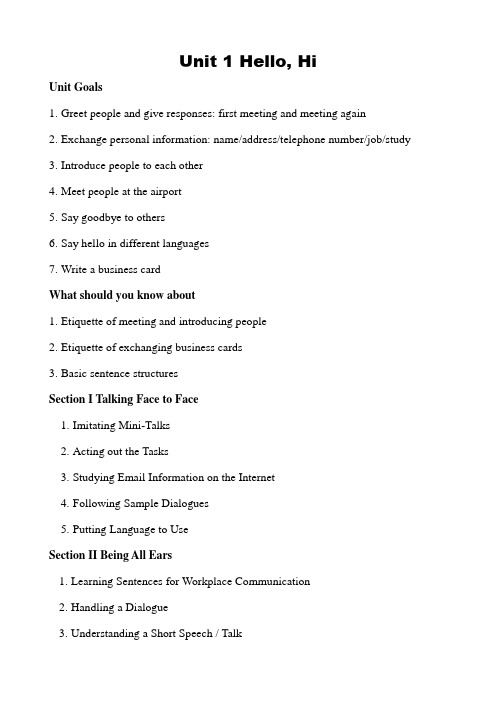
Unit 1 Hello, HiUnit Goals1.Greet people and give responses: first meeting and meeting again2.Exchange personal information: name/address/telephone number/job/study3.Introduce people to each other4.Meet people at the airport5.Say goodbye to others6.Say hello in different languages7.Write a business cardWhat should you know about1.Etiquette of meeting and introducing people2.Etiquette of exchanging business cards3.Basic sentence structuresSection I Talking Face to Face1.Imitating Mini-Talks2.Acting out the Tasks3.Studying Email Information on the Internet4.Following Sample Dialogues5.Putting Language to UseSection II Being All Ears1.Learning Sentences for Workplace Communication2.Handling a Dialogue3.Understanding a Short Speech / TalkSection III Trying your Hand1.Practicing Applied Writing2.Writing Sentences and Reviewing GrammarSection IV Maintaining a Sharp EyePassage 1 :Information Related to the Reading PassageEnglish Expressions Borrowed from FrenchOver the long years, the English language has borrowed a great number of French words or expressions. Some of them have been so absorbed in English that speakers might not realize their origin. Other expressions like “faux pas〞have retained their “Frenchness〞, with which speakers tend to sound modern. These expressions are often written in italics. The following are a few French expressions which are commonly used in English.1. Faux Pas: It refers to a socially awkward or tactless act, a foolish mistake, something that should not be done. 失礼2. au pair: A foreign female student who works for a family (cleaning and/or teaching the children) in exchange for room and board. 帮助料理家务换取住宿的外国女学生3. Bon appétit: The closest English equivalent is “Enjoy your meal〞. 用餐愉快4. esprit de corp s: It is similar to “group spirit〞or “morale〞. 团队精神5. rendez-vous: In English it means “go to〞. It can be used as a noun or a verb. 约会6. RSVP: This abbreviation stands for Répondez, s'il vous plaît, which means“Respond, please〞.敬请回复7. bon voyage: a way of saying goodbye and wishing good luck 一路平安The Business Card: a Social Faux PasYou, like most people, probably have been in such a situation where you are being asked for a business card, and while reaching for it ... and ... oops ... “I'm sorry, I must be out at the moment〞or “they must be in my other bag〞or “I left them at the office, I'm sorry,〞and the conversation continues on with some sort of story about how this “never happens to me〞or “I knew I was forgetting something this morning ...〞Missed connections are missed opportunities for business. Business cards are a useful marketing tool, and an easy one to have with you at all times. Not having your cards can be seen as being unprepared to market yourself and your business. Don't start t hat new contact leaving them thinking “that person is already unprepared〞.“Never leave home without it ...〞There are so many things we often have to remember in this go-go world we are living in … but your business cards should ALWAYS be with you.Here are a few tips for you to go take care of this right now, so youdon't get caught in this situation:✧ If you don't have a job, get Networking Cards.✧ If you are employed, and haven't had new cards in 2 or more years,it couldbe time for an update: info update and photo update ...✧ Perhaps set a goal of handing out 5 cards a day.✧ Practice what you will say when handing them out. On a daily basis, there are so many opportunities to do so. Grocery store lines, coffee shops, waiting on your car wash, meetings, and even the dog park!✧ Ask your network to network with and for you also by handing out a few!Work smarter, not necessarily harder!Language Points1 Explanation of Difficult Sentences1. (Para. 2) Missed connections are missed opportunities for business.Analysis: Missed is a verb's past participle used here as an adjective.The repeated use of the same word could bring out a stronger effect. Translation: 错失了联络就错失了商机。
新编实用英语教案unit
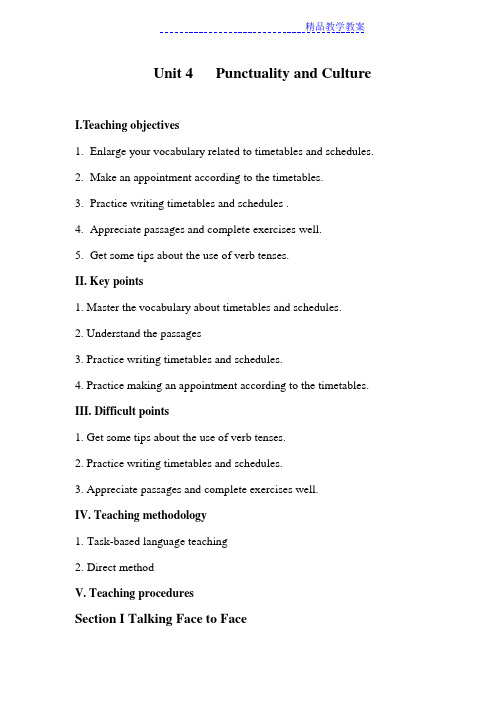
Unit 4 Punctuality and CultureI.Teaching objectives1.Enlarge your vocabulary related to timetables and schedules.2.Make an appointment according to the timetables.3.Practice writing timetables and schedules .4.Appreciate passages and complete exercises well.5.Get some tips about the use of verb tenses.II. Key points1. Master the vocabulary about timetables and schedules.2. Understand the passages3. Practice writing timetables and schedules.4. Practice making an appointment according to the timetables. III. Difficult points1. Get some tips about the use of verb tenses.2. Practice writing timetables and schedules.3. Appreciate passages and complete exercises well.IV. Teaching methodology1.Task-based language teaching2.Direct methodV. Teaching proceduresSection I Talking Face to FaceImitating Mini-Talks1.Work in pairs. Practice the following mini-talks about schedules and timetables.Acting out the Tasks2.Work in pairs and act out the tasks by following the above mini-talks.Key for reference:1)Task:Look at the flight timetable in Exercise 3. Ask about the departure and arrival time.2)Task:Look at the flight timetable in Exercise 3 .Ask about the Tuesday flight for Hong Kong.3)Task: Look at Mark’s schedule in Exercise 3. Call to ask Mark for a change of an appointment.4)Task:Look at Mark’s schedule in Exercise 3. Ask to make an appointment to see Mark on Wednesday.5)Look at Mark’s schedule in Exercise 3. An old friend in Hong Kong asks to see Mark on Thursday .Studying Timetables and Schedules3.Timetables and schedules are important in planning our activities. Read the following timetable and schedual and try to use the information to practice short dialogues.Following Sample Dialogues4. Read the following sample dialogues and try to perform your own tasks. Putting Language to Use5. Mark is going to Harbin to see the Ice Lantern Exhibition. He is asking Miss Wang to help him to find out about the train timetable. Suppose you are Mark. Read aloud the following dialogue with your partner by putting in the missing words.6. Now imagine you are a receptionist in a hotel. Mr. Johnson is asking you about information of your hotel. Fill in the blanks according to the clues given in the brackets. Then act it out with your partner.Section II Being All EarsLearning Sentences for Workplace Communication1.Listen to 10 sentences for workplace communication cross-referenced with their Chinese translations.Script: (e.g) 1). Would you please arrange a meeting for me with Dr. Johnson?2). I’d like to make an appointment to see Mr. Black.3). I’d like to confirm our meeting tomorrow afternoon.4). The train is due to arrive at 9 o’clock, but it has been delayed for one hour.5). I’d like to see you tomorrow if you have time.2.Listen to the following sentences for workplace communication in Column A and match each one with its Chinese version in Column B.3.Listen to 6 sentences for workplace communication and choose their right responses.Handling a Dialogue4.Listen to a dialogue and decode the message by filling in Susan’s schedule according to what you have heard.Understanding a Short Speech/Talk5.Now listen to a short speech/talk and fill up the blanks according to what you have heard.The words in brackets will give you some hints.6.Listen to the speech/talk again and complete the information in Column A with the right choices in Column B.Section III Trying Your HandPracticing Applied Writing1.Fill in the office hours making use of the information in the passage that follows.2.Translate the following schedule into Chinese, using the data bank in the Workbook for reference.3.Write an English schedule for the coming week according to your circumstances.Writing Sentences and Reviewing Grammarplete the following sentences, using the right verb forms.5.Correct the errors in the following sentences.6.Translate the following sentences into English.1)This is the most interesting novel he has ever written.2)The students were still laughing when the teacher came into the classroom.3)I haven’t finished the book yet, so I don’t want to return it to the library.4)Is this the first time you have come to China?5)Even if it rains in the afternoon, I will go downtown with you..6)I didn’t hear what you said just now. I was watching TV.7)I know Mr. Wang is living in Nanjing at the moment.8)The little town lies at the foot of a mountain.Write and Describe a Picture7. Suppose this is your schedule for the coming three days. Write a paragraph of about 100words based on the information given in the schedule. You may start the passage with the sentence: I’ve got a very busy schedule.Section IV Maintaining a Sharp EyePassage onenguage Points:A.Explanation of Difficult Sentences1)One of the cultural differences that tend to annoy Americans has to do with understanding of punctuality.Analysis:Has to do with is a phrase meaning has a special relationship with. It is the predicate of the sentence. That introduces a restrictive relative clause modifying differences.2)Arriving at my office 30 minutes after the appointment , I found a voice message telling me the team was waiting for me in the meeting room. Analysis: Arriving at... is a present participle phrase used as an adverbial of time. Telling me(=that told me)is a present participle phrase modifying message. The team was waiting for me in the meeting room is the object clause of the verb telling with that omitted.3)Being afraid that I had missed the appointment , I hurried in, and found them happily chatting together.Analysis:Being afraid that I had missed the appointment is a present participle clause used as an adverbial of cause. Chatting is a present participle used as the object complement.4)...if you start late you won’t be able to finish the business at hand without running beyound the scheduled ending time.Analysis:If introduces an adverbial clause of condition. Note that the pattern you won’t be able to ...without running beyound means you will... by running beyound...B.Important Words1)punctuality n. the quality of adhering to an appointed time2)pay v. be worth it3)annoy v.to disturb or irritate especially by repeated acts4)punctual a.arriving exactly at the time appointed5)attitude n. a mental state involving feelings, beliefs and values6)behavior n.manner of acting2.Passage Translation3.Read and Think: Answer the following questions according to the passage.4.Read and Complete1)Complete each of the following statements with words or phrases from thepassage.2)Fill in the blanks with the proper words or expressions given below,changing the form if necessary.5.Read and Translate6.Read and SimulatePassage twonguage Points:A.Explanation of Difficult Sentences1)Those traveling or doing business abroad should always find out the answer to this question.Analysis: traveling or doing business abroad (=who travel or do business) is a present parciple clause used as the post-modifier of those.2)It is also supposed etiquette to arrive a little late for a party, which I have never ever understood.Analysis:supposed is a past participle, used as an adjective here. Which introduces a non-restrictive relative clause and which itself refers to the whole main clause.3)... When a bridge or major high way shuts down, there may not be any way to get where you are going.Analysis: the infinitive phrase to get where you are going is the post-modifier of the noun way.4)So I would have to say that I am always early, except when I can’t get there at all, in which case I will call as soon as I know I am going to be late. Analysis: In the object that-clause, except introduces a when- clause, an adverbial clause of time, indicating an exceptional situation. In which case introduces a non-restrictive relative clause,which refers to the exceptional when-clause.B. Important Words1)standard n. a basis for comparison; a reference point agaist which other things can be evaluated2)etiquette n.the formal rules for polite behaviors3)suppose v. to believe especially on uncertain or tentative grounds; used to say what was or is expected or intended to happen4)absolutely ad. completely and in every way5)insult n./v. A remark or action that is offensive or deliberately rude; to offend someone by saying or doing something they think is rude6)case n. an example of a particular situation , problem, etc.2.Passage Translation3.Read and Judge: True/False4.Read and Translate: Translate the following sentences into Chinese.1)按照美国人的标准,巴西人不算守时。
新编实用英语综合教程(第四版)Unit-2教案
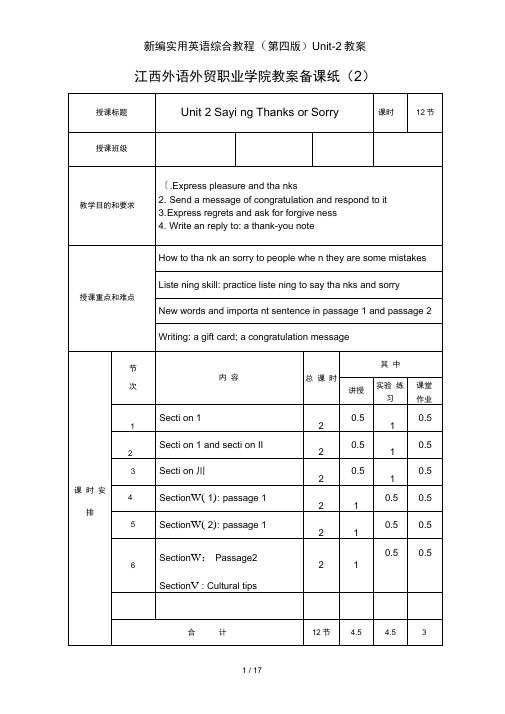
新编实用英语综合教程(第四版)Unit-2教案江西外语外贸职业学院教案备课纸(2)新编实用英语综合教程(第四版)Unit-2教案主任审阅年月日授课教师年月日江西外语外贸职业学院教案备课纸(3)新编实用英语综合教程(第四版)Unit-2 教案江西外语外贸职业学院教案备课纸(4)授课内容Unit 2Section I Talking Face to FaceThe topic of talking face to face area in this unit is to express thanks and give responseswhile exchanging gift-card and congratulation card. The focus is on the patterns that are appropriate for giving information concerning the various reasons and hoping to get the forgiveness from the other person.1. The students read the mini-talks after the teacher, and then try to recite them within five minutes in pairs.2. Ask the students to underline the useful expressions and perform the mini-talks in class.3. The students discuss in groups, summarizing the words, phrases and sentences frequently used according to the following topics with the help of the teacher. The students speak out the sentences under the guidance of the teacher, paying attention to the pronunciation and the intonation.1) sentences frequently used for expressing thanks:It was so generous of you to send me such a fine and beautiful gift.I don 't know how to express my thanks to you.I 'm grateful for all the help and encouragement you've given me.2) Sentences frequently used for expressing congratulations:Congratulations on your recent promotion!Please accept my heartiest congratulations.新编实用英语综合教程(第四版)Unit-2教案主任审阅年月日授课教师年月日江西外语外贸职业学院教案备课纸(3)新编实用英语综合教程(第四版)Unit-2 教案江西外语外贸职业学院教案备课纸(4)授课内容Unit 2Section II Being All Ears1. Give the students a few minutes to read through the printed materials for each listening item.2. Listen to the material for the first time without referring to the book.3. Listen to the material for a second time, and ask the students to answer the following questions orally.1) What is the relationship between Andy and Donna?2) What happened to Donna? How does she feel now?3) Why does Donna show her thanks to Andy?4) Where does Andy get the flowers?5) Where does Donna keep the flowers?主任审阅年月日授课教师年月日江西外语外贸职业学院教案备课纸(3)江西外语外贸职业学院教案备课纸(4)授课内容Secti on 皿Tryi ng Y our HandApplied WritingSample An alysisThe teacher summarizes briefly the format and Ianguage used in thank-you notes, con gratulati on cards and apology letters. The teacher may show the follow ing passage with PPT. Afterwards, ask the students to read it and translate it into Chinese orally. 1. More information about thank-you notes;Than k-you no tes are usually excha nged betwee n frie nds and acqua intan ces.They are brief, direct and ofte n in an in formal style. They are ofte n writte n insimple Ian guages, using courteous words and senten ces to express the writ'good wish or tha nks. The follow ing senten ces are ofte n used in tha nk-you no tes.2. More information about congratulation cards:People often write and send a congratulation card to congratulate one on suchjoyful occasions as celebrating one's promotion, wedding, birthday, graduation, etc.Con gratulati on cards are also excha nged on holidays. The Ian guage used in a con gratulatio n card usually sounds courteous and complime ntary. The followi ng expressi ons and senten ces ofte n appear in con gratulati on cards.Grammar3. Assig nment for this sect ionWritte n work: suppose you missed an appo in tme nt with your frie nd. Please write a letter of apology for his/her forgive ness.新编实用英语综合教程(第四版)Unit-2教案江西外语外贸职业学院教案备课纸(3)主任审阅 ______________________ 授课教师______________________新编实用英语综合教程(第四版)Unit-2 教案江西外语外贸职业学院教案备课纸(4)授课内容Unit 2Secti on IV (1): Passage 1 Thank you, Volun teers!1. Information Traditional Festivals in China.春节:Spring Festival ( the 1st day of the 1st lunar month) 除夕:New Year's Eve ( the day before the Spring Festival) 元宵节:Lantern Festival ( the 15th of the 1st lunar month) 清明节:Qingming/Tomb-Sweeping Festival (April 4th or 5th) 端午节:Dragon Boat Festival( the 5the of the 5th lunar month) 七夕节:Qixi Festival( the 7 th day of the 7the month of the lunar month, somewhat equivalent to Valentine's Day in English)中秋节:Mid-Autumn Festival( the 15th of the 8th lunar month) 重阳节:Double-Ninth Day ( the 9th of the 9th lunar month)2. Important Traditional Festivals in Western Countries.圣诞节:Christmas( the 25th of December) 平安夜: Christmas Eve ( the 24th of December) 情人节:Valentine's Day ( 14th of February) 愚人节:Fool's Day ( the 1st of April) 复活节:Easter( the 1st Sunday after a full moon on or after 21st of Marth) 感恩节:Thanksgiving Day ( the 4th Thursday f November) 万圣节:Halloween/All Saints'Day (31st of October)Important words1. offerv. make available or accessible, provide or furnishe.g. The conference centeroffers a health spa.The local studentoffers to guide us around the city.2. invitev. ask someone in a friendly way to do somethinge.g. Shall we invite the famous football player to join our club? Students areinvited tosubmit papers to this online magazine.新编实用英语综合教程(第四版)Unit-2 教案3. gratefula. feeling or showing thankse.g. He felt so grateful to all the strangers'help.We need to feel more grateful for what we have instead of complaining what we don't.4. breakn. a pause from doing something ( as work)e.g. The meeting was too long, so we had a tebareak .A 10-minute break between each session offers us a time to rest a bit.5. appreciatev. be fully aware of;; realize fullye.g. Do you appreciate the full meaning of this letter?I do appreciate what you have done to ease my pain.6. recognizev. show approval or appreciation ofe.g. Our effort is fully recognized by the society.The in-service training center is widely recognized here.新编实用英语综合教程(第四版)Unit-2教案江西外语外贸职业学院教案备课纸(3)主任审阅______________________年月日授课教师 ______________________年月日新编实用英语综合教程(第四版)Unit-2 教案江西外语外贸职业学院教案备课纸(4)授课内容Unit 2Section IV (2): Passage 1 Thank you, Volunteers!Language pointsExplanation of Difficult Sentences1. (Para. 1) November in the United States brings the holiday of Thanksgiving, and therefore it's in November that we tend to think of a way in which we could show our thanks to volunteers.Analysis: This is a complex sentence. The basic sentence structure is S(subject) and S in which …I n the sec ondan d-clause an emphatic structureet sinNovemberis used to emphasize the time adverbial of in November,modifying we tend to think. Which leads a relative clause, modifying away.Translation: 因此,我们在十一月里常常会想办法来表示对志愿者们的感谢。
新编实用英语综合教程1第1单元部分教案
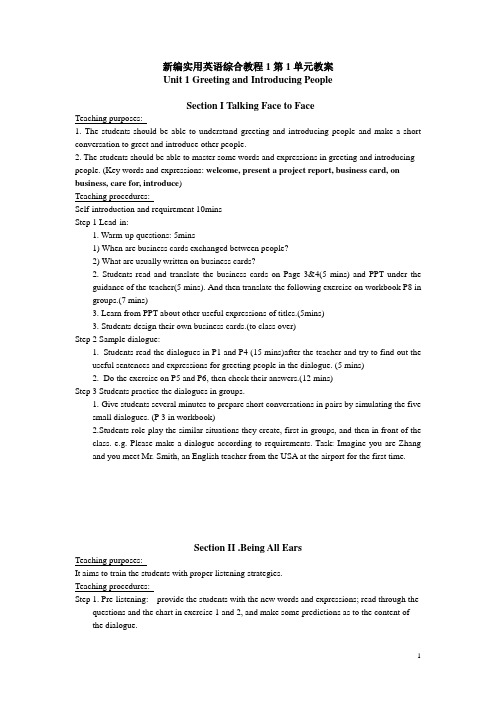
新编实用英语综合教程1第1单元教案Unit 1 Greeting and Introducing PeopleSection I Talking Face to FaceTeaching purposes:1. The students should be able to understand greeting and introducing people and make a short conversation to greet and introduce other people.2. The students should be able to master some words and expressions in greeting and introducing people. (Key words and expressions: welcome, present a project report, business card, on business, care for, introduce)Teaching procedures:Self-introduction and requirement 10minsStep 1 Lead-in:1. Warm-up questions: 5mins1) When are business cards exchanged between people?2) What are usually written on business cards?2. Students read and translate the business cards on Page 3&4(5 mins) and PPT under theguidance of the teacher(5 mins). And then translate the following exercise on workbook P8 in groups.(7 mins)3. Learn from PPT about other useful expressions of titles.(5mins)3. Students design their own business cards.(to class over)Step 2 Sample dialogue:1. Students read the dialogues in P1 and P4 (15 mins)after the teacher and try to find out theuseful sentences and expressions for greeting people in the dialogue. (5 mins)2. Do the exercise on P5 and P6, then check their answers.(12 mins)Step 3 Students practice the dialogues in groups.1.Give students several minutes to prepare short conversations in pairs by simulating the fivesmall dialogues. (P 3 in workbook)2.Students role-play the similar situations they create, first in groups, and then in front of theclass. e.g. Please make a dialogue according to requirements. Task: Imagine you are Zhang and you meet Mr. Smith, an English teacher from the USA at the airport for the first time.Section II .Being All EarsTeaching purposes:It aims to train the students with proper listening strategies.Teaching procedures:Step 1. Pre-listening: provide the students with the new words and expressions; read through the questions and the chart in exercise 1 and 2, and make some predictions as to the content of the dialogue.(Key words and expressions:1.Canada/The United States (of America) / the United Kingdom (of Great Britain andNorthern Ireland); England--Scotland--Welsh--Northern Ireland ;Britain;2.College3.Surprise surprise partyHis visit gave me a pleasant surprise. 他的来访使我感到惊喜。
新编实用英语教案Unit
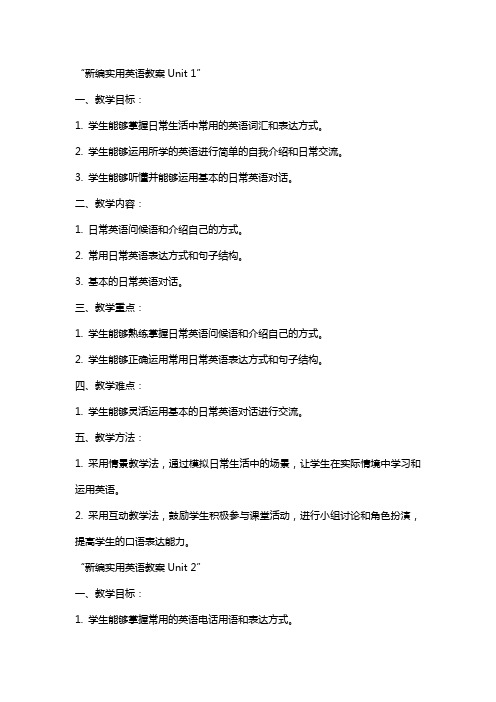
“新编实用英语教案Unit 1”一、教学目标:1. 学生能够掌握日常生活中常用的英语词汇和表达方式。
2. 学生能够运用所学的英语进行简单的自我介绍和日常交流。
3. 学生能够听懂并能够运用基本的日常英语对话。
二、教学内容:1. 日常英语问候语和介绍自己的方式。
2. 常用日常英语表达方式和句子结构。
3. 基本的日常英语对话。
三、教学重点:1. 学生能够熟练掌握日常英语问候语和介绍自己的方式。
2. 学生能够正确运用常用日常英语表达方式和句子结构。
四、教学难点:1. 学生能够灵活运用基本的日常英语对话进行交流。
五、教学方法:1. 采用情景教学法,通过模拟日常生活中的场景,让学生在实际情境中学习和运用英语。
2. 采用互动教学法,鼓励学生积极参与课堂活动,进行小组讨论和角色扮演,提高学生的口语表达能力。
“新编实用英语教案Unit 2”一、教学目标:1. 学生能够掌握常用的英语电话用语和表达方式。
2. 学生能够运用所学的英语进行电话交流。
3. 学生能够听懂并能够运用基本的日常英语对话。
二、教学内容:1. 常用英语电话用语和表达方式。
2. 电话交流的基本步骤和注意事项。
3. 基本的日常英语对话。
三、教学重点:1. 学生能够熟练掌握常用英语电话用语和表达方式。
2. 学生能够正确运用电话交流的基本步骤和注意事项。
四、教学难点:1. 学生能够灵活运用基本的日常英语对话进行交流。
五、教学方法:1. 采用情景教学法,通过模拟电话交流的场景,让学生在实际情境中学习和运用英语。
2. 采用互动教学法,鼓励学生积极参与课堂活动,进行小组讨论和角色扮演,提高学生的口语表达能力。
“新编实用英语教案Unit 3”一、教学目标:1. 学生能够掌握常用的英语购物用语和表达方式。
2. 学生能够运用所学的英语进行购物交流。
3. 学生能够听懂并能够运用基本的日常英语对话。
二、教学内容:1. 常用英语购物用语和表达方式。
2. 购物交流的基本步骤和注意事项。
新编实用英语综合教程1-unit 6-教案
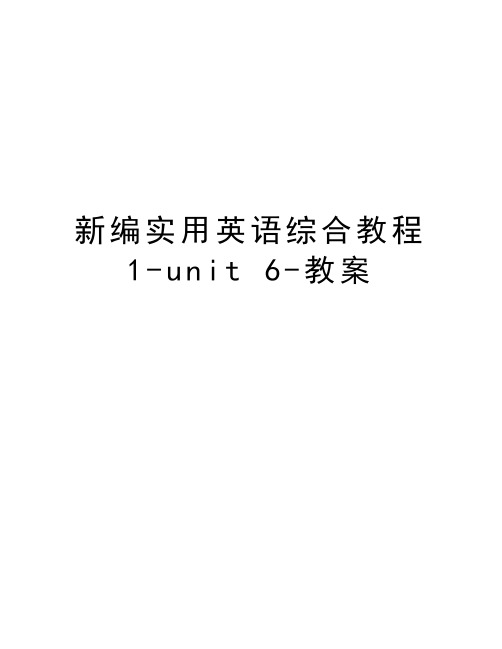
新编实用英语综合教程1-u n i t6-教案
用心整理的精品word文档,下载即可编辑!!
教案首页
精心整理,用心做精品1
用心整理的精品word文档,下载即可编辑!!
课堂组织
教案内容
精心整理,用心做精品2
用心整理的精品word文档,下载即可编辑!!
精心整理,用心做精品3
用心整理的精品word文档,下载即可编辑!!
精心整理,用心做精品4
用心整理的精品word文档,下载即可编辑!!
教案首页
精心整理,用心做精品5
用心整理的精品word文档,下载即可编辑!!
课堂组织
精心整理,用心做精品6
用心整理的精品word文档,下载即可编辑!!
教案内容
精心整理,用心做精品7
用心整理的精品word文档,下载即可编辑!!
精心整理,用心做精品8
用心整理的精品word文档,下载即可编辑!!
精心整理,用心做精品9
教案首页
课堂组织
教案内容
教案首页
课堂组织
教案内容。
新编实用英语综合教程(第四版)Unit_2教案
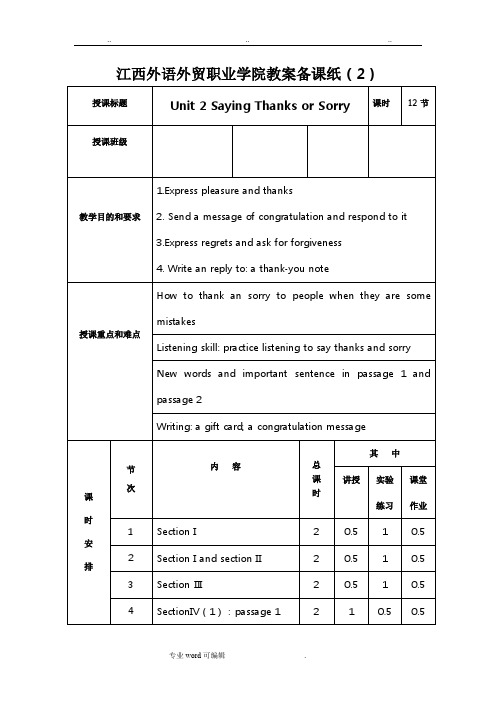
江西外语外贸职业学院教案备课纸(2)江西外语外贸职业学院教案备课纸(3)主任审阅____________________ 授课教师____________________年月日年月日江西外语外贸职业学院教案备课纸(4)授课内容Unit 2Section I Talking Face to FaceThe topic of talking face to face area in this unit is to express thanks andgive responses while exchanging gift-card and congratulation card. The focus is on the patterns that are appropriate for giving information concerning the various reasons and hoping to get the forgiveness from the other person.1. The students read the mini-talks after the teacher, and then try to recite them within five minutes in pairs.2. Ask the students to underline the useful expressions and perform the mini-talks in class.3. The students discuss in groups, summarizing the words, phrases and sentences frequently used according to the following topics with the help of the teacher. The students speak out the sentences under the guidance of the teacher, paying attention to the pronunciation and the intonation.1) sentences frequently used for expressing thanks:It was so generous of you to send me such a fine and beautiful gift.I don’t know how to express my thanks to you.I’m grateful for all the help and encouragement you’ve given me.2) Sentences frequently used for expressing congratulations:Congratulations on your recent promotion!Please accept my heartiest congratulations.江西外语外贸职业学院教案备课纸(3)主任审阅____________________ 授课教师____________________年月日年月日江西外语外贸职业学院教案备课纸(4)授课内容Unit 2Section Ⅱ Being All Ears1. Give the students a few minutes to read through the printed materials for each listening item.2. Listen to the material for the first time without referring to the book.3. Listen to the material for a second time, and ask the students to answer the following questions orally.1) What is the relationship between Andy and Donna?2) What happened to Donna? How does she feel now?3) Why does Donna show her thanks to Andy?4) Where does Andy get the flowers?5) Where does Donna keep the flowers?江西外语外贸职业学院教案备课纸(3)主任审阅____________________ 授课教师____________________年月日年月日江西外语外贸职业学院教案备课纸(4)授课内容Section Ⅲ Trying Your HandApplied WritingSample AnalysisThe teacher summarizes briefly the format and language used in thank-you notes, congratulation cards and apology letters. The teacher may show the following passage with PPT. Afterwards, ask the students to read it and translate it into Chinese orally.1.More information about thank-you notes;Thank-you notes are usually exchanged between friends and acquaintances. They are brief, direct and often in an informal style. They are often written in simple languages, using courteous words and sentences to express the writer’s good wish or thanks. The following sentences are often used in thank-you notes.2.More information about congratulation cards:People often write and send a congratulation card to congratulate one on such joyful occasions as celebrating one’s promotion, wedding, birthday, graduation, etc. Congratulation cards are also exchanged on holidays. The language used in a congratulation card usually sounds courteous and complimentary. The following expressions and sentences often appear in congratulation cards.Grammar2. Do exercises 5,6 and 7 in groups.3.Assignment for this sectionWritten work: suppose you missed an appointment with your friend.Please write a letter of apology for his/her forgiveness.江西外语外贸职业学院教案备课纸(3)主任审阅____________________ 授课教师____________________年月日年月日江西外语外贸职业学院教案备课纸(4)授课内容Unit 2Section Ⅳ(1): Passage 1 Th ank you, Volunteers!rmation Traditional Festivals in China.春节:Spring Festival ( the 1st day of the 1st lunar month)除夕:New Year’s Eve ( the day before the Spring Festival)元宵节:Lantern Festival ( the 15th of the 1st lunar month)清明节:Qingming/Tomb-Sweeping Festival (April 4th or 5th)端午节:Dragon Boat Festival( the 5the of the 5th lunar month)七夕节:Qixi Festival( the 7th day of the 7the month of the lunar month, somewhat equivalent to Valentine’s Day in English)中秋节:Mid-Autumn Festival( the 15th of the 8th lunar month)重阳节:Double-Ninth Day ( the 9th of the 9th lunar month)2.Important Traditional Festivals in Western Countries.圣诞节:Christmas( the 25th of December)平安夜: Christmas Eve ( the 24th of December)情人节:Valentine’s Day ( 14th of February)愚人节:Fool’s Day ( the 1st of April)复活节:Easter( the 1st Sunday after a full moon on or after 21st of Marth) 感恩节:Thanksgiving Day ( the 4th Thursday f November)万圣节:Halloween/All Saints’ Day (31st of October)Important words1.offerv. make available or accessible, provide or furnishe.g. The conference center offers a health spa.The local student offers to guide us around the city.2. invitev. ask someone in a friendly way to do somethinge.g. Shall we invite the famous football player to join our club?Students are invited to submit papers to this online magazine.3. gratefula. feeling or showing thankse.g. He felt so grateful to all the strangers’ help.We need to feel more grateful for what we have instead of complaining what we don’t.4.breakn. a pause from doing something ( as work)e.g. The meeting was too long, so we had a tea break.A 10-minute break between each session offers us a time to resta bit.5. appreciatev. be fully aware of;; realize fullye.g. Do you appreciate the full meaning of this letter?I do appreciate what you have done to ease my pain.6. recognizev. show approval or appreciation ofe.g. Our effort is fully recognized by the society.The in-service training center is widely recognized here.江西外语外贸职业学院教案备课纸(3)主任审阅____________________ 授课教师____________________年月日年月日江西外语外贸职业学院教案备课纸(4)授课内容Unit 2Section Ⅳ(2): Passage 1 Thank you, Volunteers! Language pointsExplanation of Difficult Sentences1. (Para. 1)November in the United States brings the holiday of Thanksgiving, and therefore it’s in November that we tend to think of a way in which we could show our thanks to volunteers.Analysis: This is a complex sentence. The basic sentence structure is S(subject) and S in which…In the second and-clause an emphaticstructure it’s in November is used to emphasize the timeadverbial of in November, modifying we tend to think. Whichleads a relative clause, modifying a way.Translation: 因此,我们在十一月里常常会想办法来表示对志愿者们的感谢。
新编实用英语综合教程(第四版)Unit-2教案
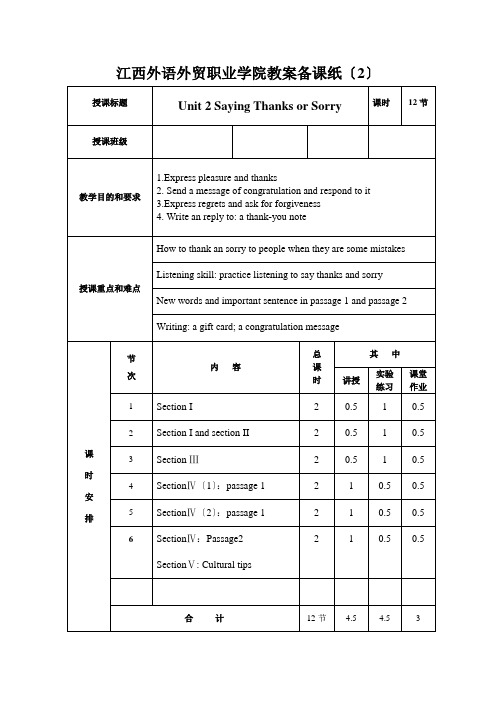
江西外语外贸职业学院教案备课纸〔2〕江西外语外贸职业学院教案备课纸〔3〕主任审阅____________________ 授课教师____________________ 年月日年月日江西外语外贸职业学院教案备课纸〔4〕授课内容Unit 2Section I Talking Face to FaceThe topic of talking face to face area in this unit is to express thanks and give responses while exchanging gift-card and congratulation card. The focus is on the patterns that are appropriate for giving information concerning the various reasons and hoping to get the forgiveness from the other person.1. The students read the mini-talks after the teacher, and then try to recite them within five minutes in pairs.2. Ask the students to underline the useful expressions and perform the mini-talks in class.3. The students discuss in groups, summarizing the words, phrases and sentences frequently used according to the following topics with the help of the teacher. The students speak out the sentences under the guidance of the teacher, paying attention to the pronunciation and the intonation.1) sentences frequently used for expressing thanks:It was so generous of you to send me such a fine and beautiful gift.I don’t know how to express my thanks to you.I’m grateful for all the help and encouragement you’ve given me.2) Sentences frequently used for expressing congratulations:Congratulations on your recent promotion!Please accept my heartiest congratulations.江西外语外贸职业学院教案备课纸〔3〕主任审阅____________________ 授课教师____________________ 年月日年月日江西外语外贸职业学院教案备课纸〔4〕授课内容Unit 2Section Ⅱ Being All Ears1. Give the students a few minutes to read through the printed materials for each listening item.2. Listen to the material for the first time without referring to the book.3. Listen to the material for a second time, and ask the students to answer the following questions orally.1) What is the relationship between Andy and Donna?2) What happened to Donna? How does she feel now?3) Why does Donna show her thanks to Andy?4) Where does Andy get the flowers?5) Where does Donna keep the flowers?江西外语外贸职业学院教案备课纸〔3〕主任审阅____________________ 授课教师____________________ 年月日年月日江西外语外贸职业学院教案备课纸〔4〕授课内容Section Ⅲ Trying Y our HandApplied WritingSample AnalysisThe teacher summarizes briefly the format and language used in thank-you notes, congratulation cards and apology letters. The teacher may show the following passage with PPT. Afterwards, ask the students to read it and translate it into Chinese orally. 1.More information about thank-you notes;Thank-you notes are usually exchanged between friends and acquaintances. They are brief, direct and often in an informal style. They are often written in simple languages, using courteous words and sentences to express the writer’s good wish or thanks. The following sentences are often used in thank-you notes.2.More information about congratulation cards:People often write and send a congratulation card to congratulate one on such joyful occasions as celebrating one’s promotion, wedding, birthday, graduation, etc. Congratulation cards are also exchanged on holidays. The language used in a congratulation card usually sounds courteous and complimentary. The following expressions and sentences often appear in congratulation cards.Grammar3.Assignment for this sectionWritten work: suppose you missed an appointment with your friend. Please write a letter of apology for his/her forgiveness.江西外语外贸职业学院教案备课纸〔3〕主任审阅____________________ 授课教师____________________ 年月日年月日江西外语外贸职业学院教案备课纸〔4〕授课内容Unit 2Section Ⅳ(1): Passage 1 Thank you, Volunteers!rmation Traditional Festivals in China.春节:Spring Festival ( the 1st day of the 1st lunar month)除夕:New Year’s Eve ( the day before the Spring Festival)元宵节:Lantern Festival ( the 15th of the 1st lunar month)清明节:Qingming/Tomb-Sweeping Festival (April 4th or 5th)端午节:Dragon Boat Festival( the 5the of the 5th lunar month)七夕节:Qixi Festival( the 7th day of the 7the month of the lunar month, somewhat equivalent to Valentine’s Day in English)中秋节:Mid-Autumn Festival( the 15th of the 8th lunar month)重阳节:Double-Ninth Day ( the 9th of the 9th lunar month)2.Important Traditional Festivals in Western Countries.圣诞节:Christmas( the 25th of December)平安夜: Christmas Eve ( the 24th of December)情人节:Valentine’s Day ( 14th of February)愚人节:Fool’s Day ( the 1st of April)复活节:Easter( the 1st Sunday after a full moon on or after 21st of Marth)感恩节:Thanksgiving Day ( the 4th Thursday f November)万圣节:Halloween/All Saints’ Day (31st of October)Important words1.offerv. make available or accessible, provide or furnishe.g. The conference center offers a health spa.The local student offers to guide us around the city.2. invitev. ask someone in a friendly way to do somethinge.g. Shall we invite the famous football player to join our club?Students are invited to submit papers to this online magazine.3. gratefula. feeling or showing thankse.g. He felt so grateful to all the strangers’ help.We need to feel more grateful for what we have instead of complaining what we don’t.4.breakn. a pause from doing something ( as work)e.g. The meeting was too long, so we had a tea break.A 10-minute break between each session offers us a time to rest a bit.5. appreciatev. be fully aware of;; realize fullye.g. Do you appreciate the full meaning of this letter?I do appreciate what you have done to ease my pain.6. recognizev. show approval or appreciation ofe.g. Our effort is fully recognized by the society.The in-service training center is widely recognized here.江西外语外贸职业学院教案备课纸〔3〕主任审阅____________________ 授课教师____________________ 年月日年月日江西外语外贸职业学院教案备课纸〔4〕授课内容Unit 2Section Ⅳ(2): Passage 1 Thank you, Volunteers!Language pointsExplanation of Difficult Sentences1. (Para. 1)November in the United States brings the holiday of Thanksgiving, and therefore it’s in November that we tend to think of a way in which we could show our thanks to volunteers.Analysis: This is a complex sentence. The basic sentence structure is S(subject) and S in which…In the second and-clause an emphatic structure it’s inNovember is used to emphasize the time adverbial of in November,modifying we tend to think. Which leads a relative clause, modifyinga way.Translation: 因此,我们在十一月里常常会想方法来表示对志愿者们的感谢。
新编实用英语教案Unit
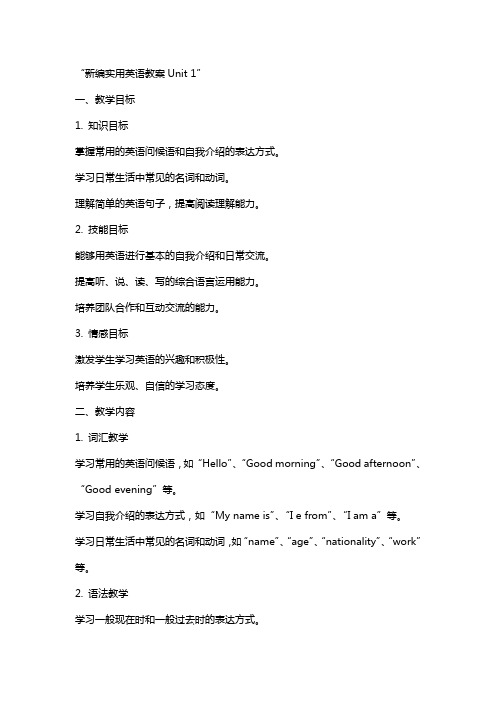
“新编实用英语教案Unit 1”一、教学目标1. 知识目标掌握常用的英语问候语和自我介绍的表达方式。
学习日常生活中常见的名词和动词。
理解简单的英语句子,提高阅读理解能力。
2. 技能目标能够用英语进行基本的自我介绍和日常交流。
提高听、说、读、写的综合语言运用能力。
培养团队合作和互动交流的能力。
3. 情感目标激发学生学习英语的兴趣和积极性。
培养学生乐观、自信的学习态度。
二、教学内容1. 词汇教学学习常用的英语问候语,如“Hello”、“Good morning”、“Good afternoon”、“Good evening”等。
学习自我介绍的表达方式,如“My name is”、“I e from”、“I am a”等。
学习日常生活中常见的名词和动词,如“name”、“age”、“nationality”、“work”等。
2. 语法教学学习一般现在时和一般过去时的表达方式。
学习常用的句型结构,如“What's your name?”、“Where are you from?”、“What do you do?”等。
3. 阅读教学阅读关于自我介绍的文章,提高阅读理解能力。
学习从文章中获取关键信息,进行简单的推理和判断。
4. 写作教学练习写一篇关于自己基本情况的小短文。
学习使用一般现在时和一般过去时进行写作。
三、教学方法1. 任务型教学法:通过小组合作、角色扮演等形式,让学生在实际情境中运用所学知识。
2. 交际型教学法:通过模拟真实场景,让学生进行听、说、读、写的实际操作,提高综合语言运用能力。
3. 情境教学法:创设情境,让学生在真实的环境中感受、体验和学习英语。
四、教学步骤1. 导入:教师与学生用英语进行问候,营造轻松愉快的课堂氛围。
2. 新课内容:讲解常用的英语问候语和自我介绍的表达方式。
3. 实践环节:学生进行角色扮演,模拟真实场景进行自我介绍。
4. 阅读理解:学生阅读关于自我介绍的文章,回答相关问题。
新编实用英语综合教程--教案
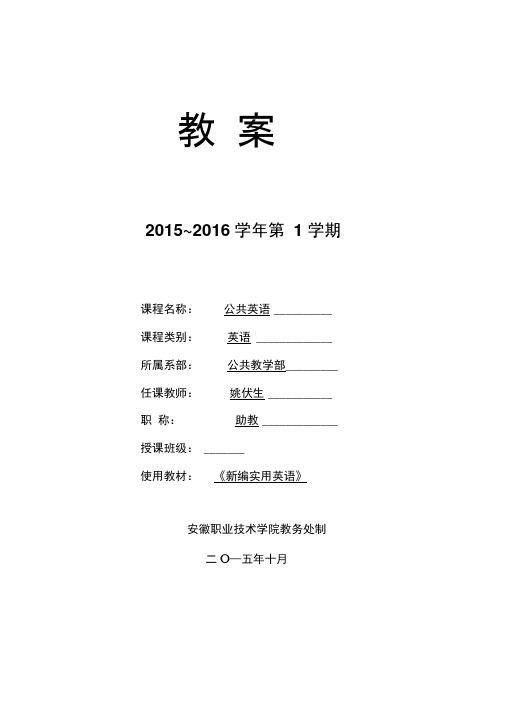
教案2015~2016学年第1 学期课程名称:公共英语__________ 课程类别:英语 _____________ 所属系部:公共教学部_________ 任课教师:姚伏生___________ 职称:助教_____________ 授课班级: _______使用教材:《新编实用英语》安徽职业技术学院教务处制二O—五年十月教案头Unit 1 Hello, Hi!Sect ion I Talk ing Face to Face•Imitating Mini-talks1. pair worka. The stude nts are asked to read the first three talks in pairs and speak out the senten ces usedwhe n people meet for the first time.b. The stude nts are the n asked to read the last two talks in pairs and speak out the senten ces used whe n people meet aga in.2. The teacher may give more expressi ons for the stude nts to practice.II. Acting out tasksPair work. The students make short conversations by following the above mini-talks.III. Studying Business Cards1. The stude nts read the bus in ess cards and an swer some questi ons.Questio ns for the two cardsa. What' s the naenof the man?b. Where does he work?c. What is his job?d. Where is his working place?2. The students read the letter again and then translate it orally under the guidance of the teacher.IV Following sample dialoguesThe stude nts read the dialogues and speak out the follow ing senten ces of greet ing and in troduci ng people. Then the stude nts will be asked to practice them.1. Hello, nice to meet you . My name is ......2. How do you do, ... I'm ....3. Welcome to ...4. Here is my card.5. Hi, l ong time no see6. How nice to see you aga in7. Have n'tsee n you for ages8. What a pleasa nt surprise!V Putting language to useThe stude nts do the exercises 5 and 6 accordi ng to the kno wledge they have mastered in the dialogues.教案头Unit 1 Hello, Hi!Sectio n n Bei ng All EarsI Learning sentences for workplace communicationThis part is to train the stude nts to un dersta nd and speak out the senten ces.4. The students listen to ten English sentences given in the course book and repeat them in the pauseallowed, trying to un dersta nd and lear n to speak them out by referri ng to their Chin ese meanin gs.5. The stude nts liste n to ten sen ten ces , and match them with their Chin ese tran slati ons.6. The students listen to six sentences giving in the course book, and then choose their right responses.2. II Handing a dialogue s.This part is moving from the sentence to the dialogue level.The stude nts liste n twice to a dialogue, and the n decode the message give n in the course book by finding the correct choiceIII. Understanding a short speechThis part of training is carried out to help the studentsto follow the continuous oral presentation of a specific practical activity which is oriented to the unit topic.1. The students listen to the speech twice and during the second listening, put back the missing words in the bla nks.2. The students listen to the speech again and match the information in Column A with the choices in Colu mn B.Unit 1 Hello, Hi!Secti on III Tryi ng Your HandI Practicing applied writing1. Sample an alysisThe teacher makes the follow ing brief an alysis of the format and Ian guage used in bus in ess cards. The teacher may take Sample 1 as an example for the an alysis and asks the stude nts some questi ons:a. What' s the namsf the man?b. Where does he work?c. What is his job?d. Where is his working place?2. pers onal in formatio n must be in cluded in a bus in ess cardfull n ame job work ing place unit address teleph one nu mber E-mail FaxII Writing sentences and reviewing grammarThe teacher in troduce basic sentence structures with the followi ng examples.1. 主语+谓语(+宾语)(+状语)Ani mals can 'speak (主+谓)Mary runs every morni ng (主+ 谓+状)They speak English (主+ 谓+宾)I gave him a visiting card.(主+谓+ 间宾+ 直宾)She loves dogs very much.(主+ 谓+宾+状)2. 主系表He is a man3. There be 句型There is a dog in the roomUnit 1 Hello, Hi!Sectio n IV Passage I The Busin ess CardsI. Warming-up questionsi. What do you think of a bus in ess card?ii. What tips should you know about the bus in ess card?II. Ask the students to skim the passage and answer the questions on Page 16.1. Have you got your bus in ess cards or n etwork ing cards? If not, why not?2. How do you un dersta nd the title of the passagThe Bus in ess Card: a Social Faux Pa?A business card is a useful tool of social networking and business connection. It is socially awkward if you find yourself without one when you need to exchange it with a new business partner.3. Why does the author say “ missed conn ecti ons are missed opport un ities for bus in ess ”?Because business cards are a useful marketing tool. If you forget to bring them with you, itMay leave the impression that you are unprepared for doing business.4. Can you expla in the tips in your own words?1) If you don't have a job, prepare your cards for networking.2) If your business cards are out of date, make them up to date.3) You should set a goal of handing out a certain number of cards every day.4) Practice what you will say for handing out your cards. Take every opportunity to handout your cards.5) Ask your social n etwork to help you send out your cards.5. What does the last sentence mean?You should work in a clever way: better work isn't necessarily harder!III. Ask students to read the new words and expressions and check their pronunciation.IV. Play the tape for the students and ask them to imitate.V. Analyze the passage and explain the language and difficult sentences.Para11. ask for sth want sthMay I ask for a photo of your little daughter?我能要一张你小女儿的照片吗?ask for sbHe is very ill and keeps asking for his daughter.他病得很厉害,再三要求见他的女儿。
新编实用英语综合教程UnitBiddingFarewall教案
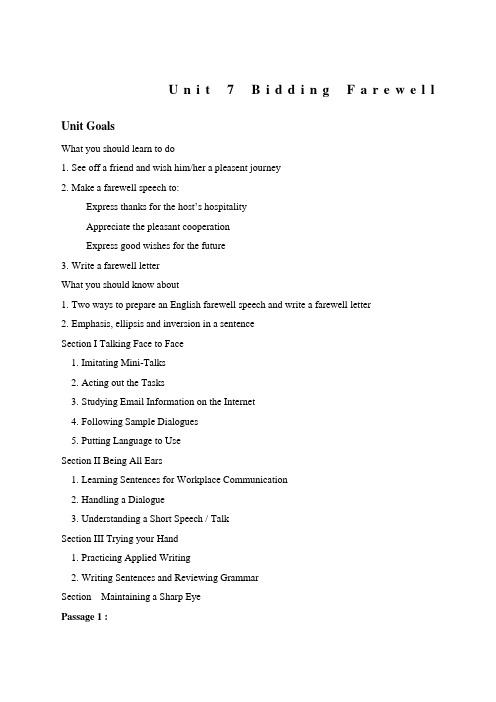
U n i t7B i d d i n g F a r e w e l lUnit GoalsWhat you should learn to do1.See off a friend and wish him/her a pleasent journey2.Make a farewell speech to:Express thanks for the host’s hospitalityAppreciate the pleasant cooperationExpress good wishes for the future3.Write a farewell letterWhat you should know about1.Two ways to prepare an English farewell speech and write a farewell letter2.Emphasis, ellipsis and inversion in a sentenceSection I Talking Face to Face1.Imitating Mini-Talks2.Acting out the Tasks3.Studying Email Information on the Internet4.Following Sample Dialogues5.Putting Language to UseSection II Being All Ears1.Learning Sentences for Workplace Communication2.Handling a Dialogue3.Understanding a Short Speech / TalkSection III Trying your Hand1.Practicing Applied Writing2.Writing Sentences and Reviewing GrammarSection Maintaining a Sharp EyePassage 1 :Text The Most Unforgettable Character I’ve MetI remember vividly that first English class in the last term of high school. We boys (there were no girls in the school) were waiting expectantly for the new teacher to appear. Before long, through the door came in a tall, unimpressive-looking man of about 40. He said shyly, “Good afternoon, gentlemen.”His voice had a surprising tone of respect, almost as if he were addressing the Supreme Court instead of a group of youngsters. He wrote his name on the blackboard —Wilmer T. Stone —then sat on the front of his desk, drew one long leg up and grasped his bony knee.“Gentlemen,”he began, “we are here this semester —your last —to continue your study of English. I know we shall enjoy learning with —and from —one another. We are going to learn something about journalism and how to get out your weekly school paper. Most important, we are going to try to really get interested in reading and writing. Those who do, I venture to say, will lead far richer, fuller lives than they would otherwise.”He went on like that, voicing a welcome message of friendliness and understanding. An unexpected feeling of excitement stirred in me.During the term that followed, his enthusiasm spread through us like a contagion. “Don’t be afraid to disagree with me,”he used to say. “It shows you are thinking for yourselves, and that’s what you are here for.”Warming to such confidence, we felt we had to justify it by giving more than our best. And we did.Mr. Stone gave us the greatest gift a teacher can bestow —an awakening of a passion for learning. He had a way of dangling before us part of a story, a literary character or idea, until we were curious and eager for more; then he would cut himself short and say, “But I suppose you have read so-and-so.”When we shook our heads, he would write the title of a book on the blackboard, then turn to us. “There are some books like this one I almost wish I had never read. Many doors to pleasure are closed to me now, but they are all open for you!”The end of the term came much too soon. The morning before graduation day the class suddenly and spontaneously decided to give Mr. Stone a literary send-off that afternoon — a goodbye party withm poems and songs for the occasion.That afternoon when Mr. Stone walked slowly into Room 318 we made him take a seat in the first row. One of the boys, sitting in the teacher’s chair, started off with a poem called “Farewell”; the rest of us were grouped around him. Mr. Stone sat tight-lipped, until toward the end when he slowly turned to the right and then to the left, looking at each of us in turn as if he wanted to register the picture on his mind.When we got to the last chorus of the parody, we saw tears rolling down Mr. Stone’s high cheekbones. He got up and pulled out a handkerchief and blew his nose and wiped his face. “Boys,”he began, and no one even noticed that he wasn’t calling us “men”any more, “we’re not very good, we Americans, at expressing sentiment. But I want to tell you that you have given me something I shall never forget.”Language Points1 Explanation of Difficult Sentences1. (Para. 1) Before long, through the door came in a tall, unimpressive-looking man of about 40.Analysis: The sentence ... through the door came in a tall, unimpressive-looking man of about 40 takes the structure of full S-V inversion. Inversion includes two types: full inversion and partial inversion is usually used in a sentence beginning with an adverbial of place (through the door in this sentence). Inversion is used to emphasize the ending part of the sentence, a tall ... man of about 40 in this case. Translation: 很快,从门口走进一个高高的、40来岁的男子,看上去其貌不扬。
新编实用英语综合教程1-unit 6-教案
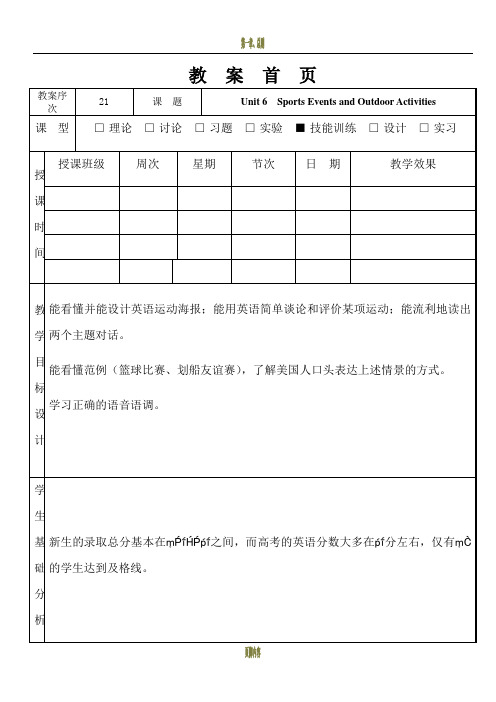
然而这方面我从未有很多困难。跟我交谈过的中国人总是说我的发
音很地道。
页脚内容
第一章、总则
我知道他们只是在说客气话而已。
:
即将成 为
结果我们激烈争论起来
页脚内容
第一章、总则 …
’
很多学生被网络游戏所吸引。
他 们 迟 早 会 认 识 到 保 护 环 境 的 重 要 性 。
学习正确的语音语调。 设 计
学 生 基 新生的录取总分基本在之间,而高考的英语分数大多在分左右,仅有 础 的学生达到及格线。 分 析
页脚内容
第一章、总则
教 本次课为第二单元听说课。对话中涵概了表达体育运动和户外活动情景时,常用的
材 交际语。听力短文为一篇介绍美国人喜欢户外烧烤的文章。参看学生练习册
择
重
点
难
点
分
析
页脚内容
教
具
选
用
第一章、总则
页脚内容
第一章、总则 课堂组织
Ⅲ
主 :
板 书
设
计
知 序号
知识点
识
点
及
时
间
分
配
时间
作
第一章、总则
其结果是以而告结束
结果是我多骑了公里的自行车。长跑时我哭了一路。
糟糕的是我没有同龄选手可以一起训练。她说。那可真是 好笑。
页脚内容
第一章、总则
根据一份报告统计,每个美国人中就有一个人曾经练过或者正在
练习某一流派的武术。
作
计划布置
业 ,
布
置
实际布置 ,
课
后
自
评
教学提示
《新编实用英语综合教程》第1册 第1单元教案
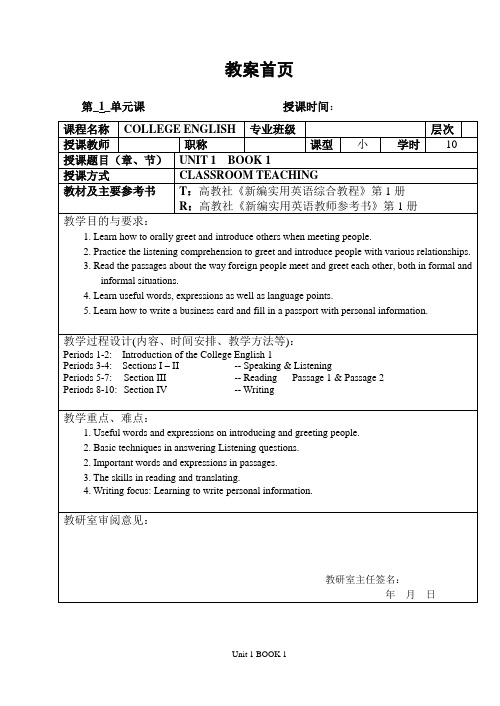
2. Important words and expressions in passages.
3. The skills in reading and translating.
4. Writing focus: Learning to write personal i年月日
教案首页
第_1_单元课授课时间:
课程名称
COLLEGE ENGLISH
专业班级
层次
授课教师
职称
课型
小
学时
10
授课题目(章、节)
UNIT 1 BOOK 1
授课方式
CLASSROOM TEACHING
教材及主要参考书
T:高教社《新编实用英语综合教程》第1册
R:高教社《新编实用英语教师参考书》第1册
教学目的与要求:
1. Learn how to orally greet and introduce others when meeting people.
2. Practice the listening comprehension to greet and introduce people with various relationships.
3. Read the passages about the way foreign people meet and greet each other, both in formal and informal situations.
4. Learn useful words, expressions as well as language points.
新编实用英语综合教程1一单元教案

Homework--- Ex. 5-6, P10.
计划布置 作
业
Ex.5, P10.
布
置
知识点
时间
10’
78’
2’
实际布置
Ex.5, P10.
课 后 自 评
2
教学提示
教案内容
备课内容(教学设计、知识点、课堂组织、教学方法等)
Unit One: Greeting and Introducing People (1)
课型
■ 理论 □ 讨论 □ 习题 □ 实验 □ 技能训练 □ 设计 □ 实习
授 授课班级 课 监理 1003/1104
时 地隧 1101/1102 间
周次 6 6
星期 6 6
节次 2 2
日期 2011/10/8 2011/10/8
教学效果
教 学 目 标 设 计
学 生 基 础 分 析
教 材 分 析
教 法 选 择
7. call 8. acquaint
课堂组织
Unit One: Passage 1
Difficult Sentences 1. The Way Americans Greet 2. Speaking of…time, I’ve got to run. 3. “Glad to meet you. I’m Miller. But call me Paul.” 4. But Americans do sometimes ask such questions. 5. In this way they can get better acquainted with you
湖北国土资源职业学院
教案
2011 - 2012 学年 第一学期
新编实用英语综合教程UnitBiddingFarewall教案
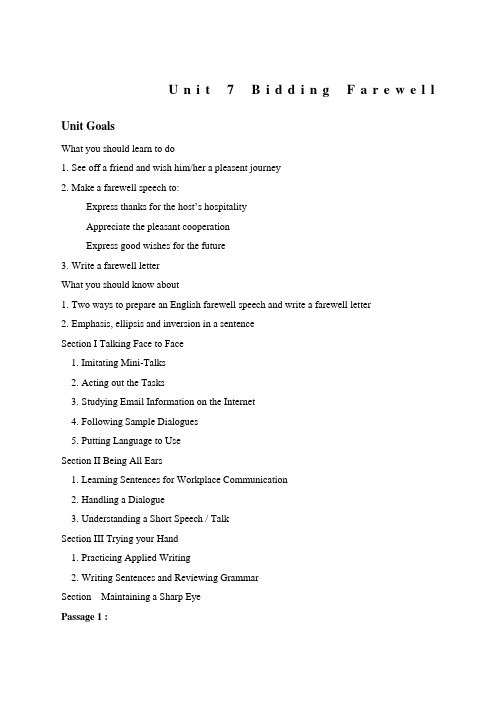
U n i t7B i d d i n g F a r e w e l lUnit GoalsWhat you should learn to do1.See off a friend and wish him/her a pleasent journey2.Make a farewell speech to:Express thanks for the host’s hospitalityAppreciate the pleasant cooperationExpress good wishes for the future3.Write a farewell letterWhat you should know about1.Two ways to prepare an English farewell speech and write a farewell letter2.Emphasis, ellipsis and inversion in a sentenceSection I Talking Face to Face1.Imitating Mini-Talks2.Acting out the Tasks3.Studying Email Information on the Internet4.Following Sample Dialogues5.Putting Language to UseSection II Being All Ears1.Learning Sentences for Workplace Communication2.Handling a Dialogue3.Understanding a Short Speech / TalkSection III Trying your Hand1.Practicing Applied Writing2.Writing Sentences and Reviewing GrammarSection Maintaining a Sharp EyePassage 1 :Text The Most Unforgettable Character I’ve MetI remember vividly that first English class in the last term of high school. We boys (there were no girls in the school) were waiting expectantly for the new teacher to appear. Before long, through the door came in a tall, unimpressive-looking man of about 40. He said shyly, “Good afternoon, gentlemen.”His voice had a surprising tone of respect, almost as if he were addressing the Supreme Court instead of a group of youngsters. He wrote his name on the blackboard —Wilmer T. Stone —then sat on the front of his desk, drew one long leg up and grasped his bony knee.“Gentlemen,”he began, “we are here this semester —your last —to continue your study of English. I know we shall enjoy learning with —and from —one another. We are going to learn something about journalism and how to get out your weekly school paper. Most important, we are going to try to really get interested in reading and writing. Those who do, I venture to say, will lead far richer, fuller lives than they would otherwise.”He went on like that, voicing a welcome message of friendliness and understanding. An unexpected feeling of excitement stirred in me.During the term that followed, his enthusiasm spread through us like a contagion. “Don’t be afraid to disagree with me,”he used to say. “It shows you are thinking for yourselves, and that’s what you are here for.”Warming to such confidence, we felt we had to justify it by giving more than our best. And we did.Mr. Stone gave us the greatest gift a teacher can bestow —an awakening of a passion for learning. He had a way of dangling before us part of a story, a literary character or idea, until we were curious and eager for more; then he would cut himself short and say, “But I suppose you have read so-and-so.”When we shook our heads, he would write the title of a book on the blackboard, then turn to us. “There are some books like this one I almost wish I had never read. Many doors to pleasure are closed to me now, but they are all open for you!”The end of the term came much too soon. The morning before graduation day the class suddenly and spontaneously decided to give Mr. Stone a literary send-off that afternoon — a goodbye party withm poems and songs for the occasion.That afternoon when Mr. Stone walked slowly into Room 318 we made him take a seat in the first row. One of the boys, sitting in the teacher’s chair, started off with a poem called “Farewell”; the rest of us were grouped around him. Mr. Stone sat tight-lipped, until toward the end when he slowly turned to the right and then to the left, looking at each of us in turn as if he wanted to register the picture on his mind.When we got to the last chorus of the parody, we saw tears rolling down Mr. Stone’s high cheekbones. He got up and pulled out a handkerchief and blew his nose and wiped his face. “Boys,”he began, and no one even noticed that he wasn’t calling us “men”any more, “we’re not very good, we Americans, at expressing sentiment. But I want to tell you that you have given me something I shall never forget.”Language Points1 Explanation of Difficult Sentences1. (Para. 1) Before long, through the door came in a tall, unimpressive-looking man of about 40.Analysis: The sentence ... through the door came in a tall, unimpressive-looking man of about 40 takes the structure of full S-V inversion. Inversion includes two types: full inversion and partial inversion is usually used in a sentence beginning with an adverbial of place (through the door in this sentence). Inversion is used to emphasize the ending part of the sentence, a tall ... man of about 40 in this case. Translation: 很快,从门口走进一个高高的、40来岁的男子,看上去其貌不扬。
- 1、下载文档前请自行甄别文档内容的完整性,平台不提供额外的编辑、内容补充、找答案等附加服务。
- 2、"仅部分预览"的文档,不可在线预览部分如存在完整性等问题,可反馈申请退款(可完整预览的文档不适用该条件!)。
- 3、如文档侵犯您的权益,请联系客服反馈,我们会尽快为您处理(人工客服工作时间:9:00-18:30)。
教 材 分 析
本次课为第二单元听说课。对话中涵概了表达体育运动和户外活动情景时,常用的 交际语。听力短文为一篇介绍美国人喜欢户外烧烤的文章。参看学生练习册 (workbook P78 ),计划 2 学时完成。
课 后 自 评
教案内容
教学提示
备课内容(教学设计、知识点、课堂组织、教学方法等)
Section Ⅰ Talking Face to
Face
参看学学·练练·考
Unit Six: Sports Events and Outdoor Activities
(Note:★---focal point,▲--- difficult point)
8. make it look attractive
9. highlight
堂组织
Unit Six
1. well done 2. It is …who… 3. too … to 4. multi-purpose 5. 21st Century 6. eager 7. the English corner 8. I do feel a bit like a fish a fish
教
案
首
页
教案序次 21 课 题
Unit 6 Sports Events and Outdoor Activities
课 型 □ 理论 □ 讨论 □ 习题 □ 实验 ■ 技能训练 □ 设计 □ 实习
授课班级 周次 星期 授 课 时 间
节次
日期
教学效果
教 学 能看懂并能设计英语运动海报;能用英语简单谈论和评价某项运动;能流利地读出 目 两个主题对话。 标 能看懂范例(篮球比赛、划船友谊赛),了解美国人口头表达上述情景的方式。 设 学习正确的语音语调。 计
What do you feel like doing exactly? Xiao Li: ??I haven't made up my mind yet. What do you think? Bob: ? ?How about a bicycle ride to the lake area? Xiao Li: ??Good idea! Let's take a ride through the woods. Bob: ? ?Yeah! It would be so nice to take in the beauty of nature. Xiao Li: ??Yes, indeed. We'd better go slowly so that we can see more of the view. Bob: ? ? And we can take deep breaths of the fresh air. Xiao Li: ??Now let's see what we should bring with us. Swimming suits? Bob: ? ?No, the water might be cold by now. Just some food and drinks. Oh, yes, and perhaps the?barbecue grills. Xiao Li: ??Barbecue grills? All right. With them we can have a good picnic by the lake. Bob: ? ?And how about the fishing rod and fishing line??
■ 理论 □ 讨论 □ 习题 □ 实验 □ 技能训练 □ 设计 □ 实习
授 授课班级 周次 星期 节次 课 时 间
日期
教学效果
教 ·牢记 Passage 1 中所出现的生词和短语,理解课文大意,学会用英语评论体育活动。
学 看懂并能设计体育海报。
目 ·能独自完成 页第二至三道练习题,能在老师的帮助下,完成其余的练习题。
Ⅵ.Script
Bob: ? ?Look, Xiao Li. What a clear day! Xiao Li: ??Yes, it looks very nice. A good day for outdoor activities. Bob: ? ?Right. And it will be good for us to spend time outdoors.
﹡Students do Put-in-Use exercises in groups in groups by reading out loud all the three dialogues they have completed.
Dialogue The General Idea of the
Section Ⅱ appropriate for writing posters, notices and announcements.
Being All Ears Ⅱ. Lead-in: posters
1. Warm-up questions ◇What are the purposes of sports event posters? ◇Have you ever designed an English poster for any of your college
间
Meeting People Again
分 Being all ears ---- Dialogue & Passage
配 ◆ Post-teaching
Summary
Homework---P89. Put in Use
计划布置
作
业
Ex.1-3,P89.
布
置
实际布置
Ex.3,P89.
时间
12’ 75’ 2’
sports event?
2. Students read and translate the posters in this part under the guidance of the teacher.
Ⅲ. Sample Dialogues
1. Warm-up questions ◇Can you design a simple sports event poster in English? ◇Do you know how to invite people to go and watch a sports game in English? ◇Are you interested in making comments on a sports event in English? ◇How can you invite people to take part in an activity in English?
and ask the students to take notes of the key words. 4. Play the tape for the third time, and ask the students to simultaneously repeat while they are listening. 5. Do all the exercises in this section.
Passage key
Ⅴ. Listening Practice
1. Give the students a few minutes to read through the printed materials for each listening item.
2. Listen to the tape for the first time without looking at the book. 3. Play the tape with a pause after each sentence for the second time
点 3. Talking about and commenting on a spnd expressions: cheer for/support, be eager/keen to, used to, beat,
析
on the team
教 具 选 Tape-recorder/Multi-medium/Language Lab. 用
five small dialogues, first in groups, and then in front of the class.
Ⅳ. Assignments for this section:
﹡Pair work: Invent some situations of inviting your classmates to watch a sports game according to a poster.
课
SectionⅠ& Section Ⅱ
Language Points:
1. the students’ union
主 2. Chinese opera
板 3. The Storm
书
4. freshmen 5. exhibit—
设 6. available
计 7. give sb. Some advice on
3. Students practice the dialogues in groups. 4. Give students several minutes to prepare short conversations in pairs
by simulating the five small dialogues. 5. Students role-play the similar situations they create consulting the
